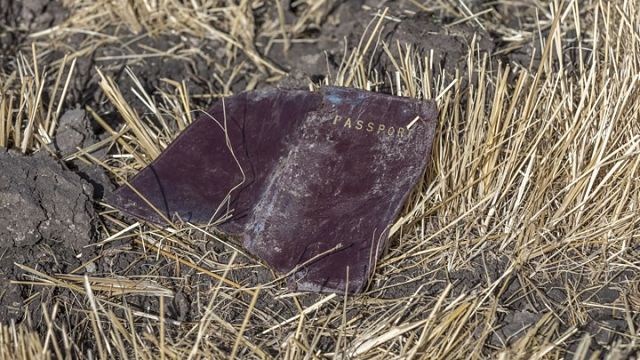 Media coverage of the crash of Ethiopian Airlines Flight 302 framed a horrifying accident in appallingly familiar ways. (Photo: A passenger passport lies on the ground at the scene of an Ethiopian Airlines crash south of Addis Ababa/Mulugeta Ayene/AP)
Media coverage of the crash of Ethiopian Airlines Flight 302 framed a horrifying accident in appallingly familiar ways. (Photo: A passenger passport lies on the ground at the scene of an Ethiopian Airlines crash south of Addis Ababa/Mulugeta Ayene/AP)

By Hannah Giorgis
On Sunday morning, an Ethiopian Airlines jetliner crashed shortly after leaving Bole International Airport in Addis Ababa, Ethiopia’s capital, en route to Nairobi, the capital city of neighboring Kenya. Minutes after takeoff, the Boeing 737 Max 8—the same model of aircraft that went down in Indonesia several months ago—lost contact with air-traffic controllers. Soon after, the aircraft crashed; all 157 people on board Flight 302, including the crew, died.
According to a list shared by Ethiopian Airlines following the crash, these passengers hailed from 35 countries. Several nations suffered more than five casualties—among them, Kenya, Canada, Ethiopia, China, Italy, the United States, France, the United Kingdom, and Egypt. In the hours following initial reports, the corners of Twitter, WhatsApp, and Facebook frequented by African users were filled with shock and horror, mourning and disbelief. The crash seemed senseless, and its human toll devastating.
But in the aftermath of the tragedy, many Western media outlets reported the news with unevenly rationed compassion. Some stoked unfounded suspicions about the caliber of the airline itself. Others stripped their reporting of emphasis on Africa almost entirely, framing the tragedy chiefly in terms of its impact on non-African passengers and organizations.
On a broadcast of the Turkish channel TRTWorld, for example, the British anchor Maria Ramos asserted that Ethiopian Airlines had a “poor safety record historically,” a baseless claim that the British aviation analyst Alex Macheras challenged on air, even after Ramos suggested that a 1996 hijacking attempt made the African airline categorically unsafe. (Macheras also contextualized Ethiopian Airlines’ record, by comparing it to that of American and European carriers such as United Airlines, Air France, and American Airlines.) On Twitter, the Financial Times’ East Africa–based reporter pondered in a now-deleted tweet whether “questions may well be asked about the pace of the carrier’s rapid expansion since 2010,” despite acknowledging that the reasons for the crash remained unknown.
—
Related:
‘Black Box’ Recovered in Ethiopian Airlines Plane Crash
Ethiopia Mourns Crash Victims as Investigators Seek Answers (AP UPDATE)
Ethiopia grounds Boeing aircraft involved in devastating crash that killed all aboard (Washington Post)
Passengers Who Missed Doomed Ethiopia Flight ‘lucky’ to be Alive (The New York Post)
No Survivors in Ethiopian Airlines Crash En Route to Kenya (AP)
Join the conversation on Twitter and Facebook.

























